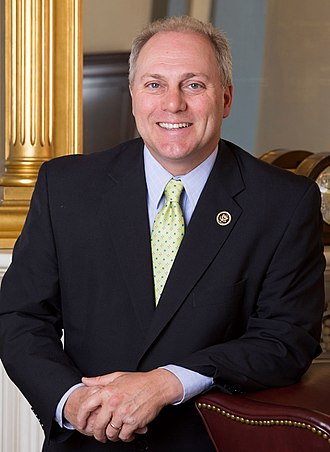Rep. Scalise Tries Again to Repeal Must-Carry, Retrans Regime
House Majority Whip Steve Scalise (R-La.) Monday (July 23) launched another effort at massive communications deregulation, one he has been pushing for most of a decade, so far without success.
Scalise has reintroduced a discussion draft of his Next Generation Television Marketplace Act, which repeals must-carry and retransmission consent rules and the compulsory license. That is the license that allows broadcasters to include nonlocal programming in their retrans deals without having to secure individual rights from national network and syndication rightsholders.

The bill would also "eliminate the government's role in defining the scope of programming exclusivity" and "codify the repeal of certain limitations imposed on local broadcasters that prevent them from adapting to today’s dynamic communications marketplace."
Like previous incarnations, the bill also includes eliminating the network nonduplication and syndicated exclusivity rules, as well as broadcast ownership limits.
[Read: Retransmission Overhaul Launched]
“Innovation tends to follow the path of least government resistance. For proof, look no further than the growth of online streaming services that are operating in a completely free market, while competing against other platforms that are regulated as if they were still monopolies from the 1990s," said Scalise. "My legislation will level the playing field so consumers can benefit from even more freedom in the video marketplace.”
Broadcasters wouldn't mind getting rid of more ownership restrictions, but getting rid of must-carry and retrans and network nondupe and exclusivity rules are nonstarters. The National Association of Broadcasters will strongly oppose the bill, according to an NAB spokesperson, as it has previous versions.
Get the TV Tech Newsletter
The professional video industry's #1 source for news, trends and product and tech information. Sign up below.
“Today’s media marketplace has never been more robust, with consumer access to broadcast programming on more platforms than at any time in history," said NAB EVP Dennis Wharton. "Unfortunately, the Next Generation Television Marketplace Act would undermine this great American success story. It would severely damage broadcasters’ ability to serve local communities and hurt tens of millions of viewers who rely every day on broadcast TV for news, entertainment and lifeline weather coverage."
But the bill has plenty of supporters.
"As the former president of an association of local TV stations, former president of network distribution for Fox, former president of the ABC Television Network, former executive VP of The Walt Disney Company and a former law professor, I write to strongly support House Majority Whip Steve Scalise’s Bill, The Next Generation Television Act," blogged Preston Padden, whose resume includes expert witness on the Hill for why the compulsory license should go.
"His Bill would repeal a steaming pile of outdated, conflicting and unnecessary government interventions into the market for distributing television programming," said Padden.
"The bill would at long last eliminate or substantially curtail legacy video regulations based on perceptions of the market in the early 1990s, or even earlier," said Free State Foundation President Randolph May. "If adopted, the NextGen TV Act would bolster free market competition and free speech in the video services market."
“The American Television Alliance, a voice for the TV viewer, commends Congressman Steve Scalise for his thoughtful leadership to reform and update America’s broken and outdated video laws," said the American Television Alliance, which has been advocating for major retrans reform in the face of what it says are skyrocketing broadcaster fee asks and blackouts. “The Next Generation Television Marketplace Act will jump-start and elevate a long-overdue conversation about modernizing the rules of the road for how Americans access and pay for video content. The legislation is forward-thinking, free-market oriented and pro-consumer."
"ACA applauds Rep. Scalise for introducing legislation designed to overhaul archaic media laws and policies," said ACA President Matt Polka. "The Scalise bill, to its credit, will prompt lawmakers and stakeholders to begin important conversations that should result in legislation next year that will truly serve the public interest."
“The regulations used to govern the video marketplace are out of date and no longer reflect the options and ways consumers obtain and view their content," said Verizon SVP Robert Fisher. "Congress should consider the changing technology enabled by a growing internet ecosystem as they create a new video marketplace framework....This legislation will begin the conversation to modernize our nation’s video policies as the marketplace responds to rapidly changing consumer demands.”
“Dish commends Rep. Scalise for his continued leadership on behalf of consumers," said Dish SVP Jeff Blum. "The broken retransmission consent regime is in dire need of comprehensive reform, and customers have been left paying the price through broadcaster blackouts and skyrocketing retransmission consent rates.”
“NTCA appreciates Congressman Scalise’s willingness to take on the difficult issue of updating video policy by introducing this legislation," said Shirley Bloomfield, CEO of NTCA–The Rural Broadband Association. "As consumer consumption of video continues to evolve, it is essential to examine video marketplace failures and consider updates to existing laws and regulations, especially in rural areas where many residents can’t receive broadcast signals. We look forward to engaging in this important discussion with Congress, and ultimately to the passage of legislation that will address the critical shortcomings in the existing rules governing this marketplace.”
“Charter applauds Majority Whip Steve Scalise for reintroducing the Next Generation Television Marketplace Act," the company said in a statement. "Congressman Scalise is rightly reexamining a broken system that has resulted in retransmission consent fees rising exponentially over the last decade. We look forward to working with him and his colleagues in Congress to reform the outdated rules and better protect consumers.”
Contributing editor John Eggerton has been an editor and/or writer on media regulation, legislation and policy for over four decades, including covering the FCC, FTC, Congress, the major media trade associations, and the federal courts. In addition to Multichannel News and Broadcasting + Cable, his work has appeared in Radio World, TV Tech, TV Fax, This Week in Consumer Electronics, Variety and the Encyclopedia Britannica.

